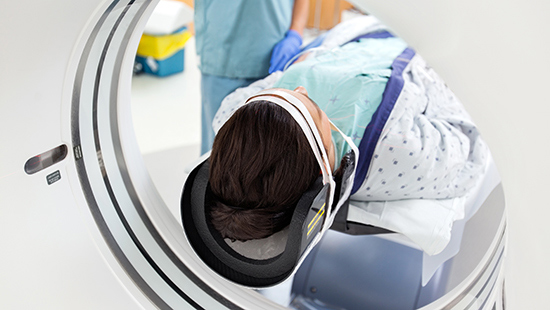CT Scan

Computer tomography (CT) scans create highly detailed, cross-sectional images, or slices, of internal organs, bones, soft tissue and blood vessels.
This painless, noninvasive, computerized diagnostic X-ray can also be processed into 3D images.
Depending on their condition and purpose of the scan, CT scans may use contrast material that is administered to the patient to enhance the images.
To make a CT scan appointment at our two imaging locations, call 410-328-3225.
Reasons to Get a CT
Because CT provides detailed views of all types of organs and tissue, it is one of the best, fastest ways to diagnose conditions that affect the chest, abdomen and pelvis. This includes orthopedic joint injuries, aneurysms and other vascular conditions.
We also use CT scans to diagnose cancers of the liver, kidney, brain and pancreas. The detailed images allow our specialists in radiation oncology to get a precise measure of a tumor's size, location and whether it has metastasized.
CT Scan With Contrast
Contrast material helps better define the blood vessels, arteries and organs during the scan. If you need contrast material for your CT scan, you may drink a solution or take it intravenously or both, depending on the type of examination. CT scans that usually require contrast material include:
- Abdomen and pelvis – Vessels and organs within the abdominal cavity
- Chest – Vessels and organs within the chest cavity
- Head, brain and temporal bones – Internal tissue and bone structures inside the head
If your CT will use contrast, there may be special preparation instructions. Contact your doctor for more information.
CT Scans Without Contrast
Many areas of the body don't need contrast material to allow doctors to evaluate internal structures, blood vessels and organs. These include:
- Abdominal and pelvic organs – Rare and complex conditions
- Extremities – Abnormalities in bone, muscle and soft tissue
- Head and brain – Internal tissue and bone structures inside the head
- Sinus cavities – Fluid or thickening of the membranes in the sinus cavity
- Spine – Bone, muscle, soft tissue and blood vessels
Specialized CT Scans
PET/CT Scan
Positron emission tomography (PET) is combined with CT to examine organ and tissue function at the cellular level.
PET/CT scans help diagnose conditions like cancer, determine blood flow to the heart muscle, and evaluate brain tumors, memory disorders and conditions that affect the central nervous system.
Heart Scan
Also known as calcium scoring, a heart scan is a special kind of CT. It calculates your risk of developing coronary artery disease by measuring the amount of calcified plaque in the coronary arteries.
Virtual Colonoscopy
This noninvasive form of colonoscopy uses a CT scan to diagnose colon and bowel disease, including polyps, diverticulitis and cancer. A virtual colonoscopy can be a good option for those at lower risk for colon cancer. To schedule this procedure, call 667-214-1571.
During Your CT Scan
At the University of Maryland, X-ray technologists oversee CT scans. Radiologists review the scans to make a diagnosis.
You will wear a gown during your scan, and remove any metallic accessories. The CT scanner resembles a large doughnut with a table through the hole. You lie on the table during the approximately 30-second scan.
